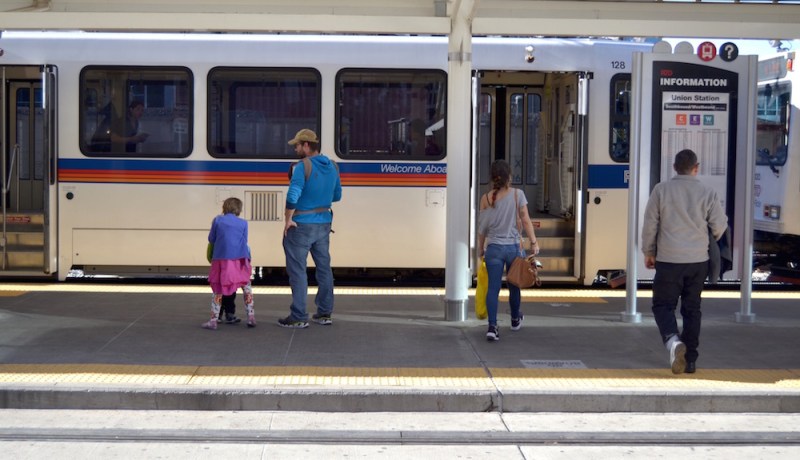Will RTD Secure the Funds to Make Transit Fares Fairer for Low-Income Riders?
So far the agency is not pursuing new funding streams to make its fare structure more equitable.

If RTD is going to offer discount fares to low-income riders, it won’t be free. But the agency is not seeking the funding necessary to pay for such a program.
Advocates have long called for a fare discount for low-income riders, pointing out that more affluent riders already benefit from bulk discounts. The RTD Pass Program Working Group is looking at how to revise the agency’s complicated bulk transit pass program with an eye toward fairness, and has orders not to exceed the agency’s budget for subsidizing passes.
Last week, a consultant for the working group roughly outlined what the effect of three new bulk fare structures under consideration might be [PDF]. A discount for low-income riders would lead them to make more transit trips, while corresponding reductions in bulk discounts would lead other demographics to ride transit less, according to modeling by Four Nines Technologies.
Overall revenue would be lower in each scenario, but the scale of the effect was not disclosed.
“One of the things that the working group is going to figure out through this process of passenger discounts is that there is a cost associated with those discounts,” said Michael Washington, RTD’s transit equity manager and the project lead. “So if you’re saying you want discount products, you’re ultimately saying that you want to reduce revenue.”
No one was under the illusion that a new discount would cost nothing. But advocates for low-income riders say the agency should be taking an active role in securing the necessary funds to pay for it. RTD did not support a bill that would have raised $10 million for low-income transit passes when it came before a legislative committee at the Capitol earlier this month.
The decision to stay on the sidelines bewildered 9to5 Colorado, an organization that has advocated for a half-price fare for low-income residents for years. “From our understanding the Pass Program group has not taken responsibility for actually acquiring the funds — it was… created to structure the programs,” 9to5 reps wrote in a letter to RTD. “This is why it is so difficult for us to understand why RTD wouldn’t be the strongest advocate for this bill.”
Currently RTD sells discount passes in bulk to businesses, colleges, and neighborhood groups. They all have an interest in maintaining their preferential prices. In addition, more than half of RTD’s fare revenue comes from these passes — especially the ones for businesses and schools — so the agency is reluctant to change them.

The working group has narrowed the options for a new discount fare structure down to three scenarios, labeled B, C, and E. All include half-price fares for low-income riders with some reduction in other discounts to partially offset the costs.
RTD would lose revenue in every scenario, according to the model, but the presentation did not reveal the size of the effect on ridership or revenue. That information is expected to be released at the working group’s next meeting.
Here’s a look at the three options under consideration.
“Option B” creates a 50 percent discount for low-income riders while eliminating the college and neighborhood EcoPass programs. The business EcoPass would be retained, but instead of buying unlimited passes, businesses would pay per trip at a discount:
A similar option would keep the business and college passes, but change both of them from unlimited passes to per-trip discounts:

The third option keeps unlimited ride passes for the business, college, and neighborhood programs, but the prices would rise. In addition, a new $5 per card fee would be assessed on businesses. This scenario also includes discount pass for youth as well as the half-price fare for low-income riders:

The 26-person working group, which includes heavy hitters from the business sector, housing and transit advocates, transportation planners, and government decision-makers, will recommend changes early next year.



